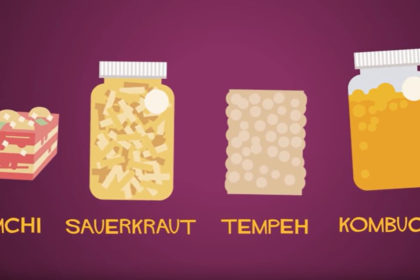
Americans are hearing the term “microbiome” a lot lately. It’s become a common phrase in health food marketing. But the microbiome is still uncharted territory in science.
Dr. Shilpa Ravella, a gastroenterologist and professor of medicine at Columbia University Medical Center, says a large army of trillions of bacteria lives on or in us, and we can alter that bacteria by fueling it with the right (or wrong) foods.
“There are also ways of preparing food that can actually introduce good bacteria, also known as probiotics, into your gut. Fermented foods are teeming with helpful probiotic bacteria, like lactobacillus and bifidobacteria,” Ravella says.
Fermented food and drink are critical to caring for gut bacteria. Because fermented products are minimally processed and provide nutrient-rich variety to diets, she adds.
But that doesn’t mean all fermented products are created equally. Yogurt is a beneficial food, for example, but some brands add too much sugar and not enough beneficial bacteria that the yogurt may not actually help.
Ravella shared her insight in a TedED talk. As the director of Columbia’s Adult Small Bowel Program, she works with patients plagued by gut issues.
“We don’t yet have the blueprint for exactly which good bacteria a robust gut needs, but we do know it’s important for a healthy microbiome to have a variety of bacterial species,” she adds. “Maintaining a good balanced relationship with them is to our advantage.”
Gut bacteria breaks down food the body can’t digest, produces important nutrients, regulates the immune system and protects our bodies from harmful germs.
Though multiple factors affect our microbiome – the environment, medications and even whether or not we were birthed vaginally or through a C-section – the food we eat is one of the most powerful allies for the microbiome.
“Diet is emerging as one of the leading influences on the health of our guts,” Ravella adds. “While we can’t control all these factors, we can manipulate the balance of our microbes by paying attention to what we eat.”
In addition to fermented food and drink, fiber is also key. Dietary fiber in foods like fruit, vegetables, nuts, legumes and whole grain are scientifically proven to colonize the gut.
“While we’re only beginning to understand the vast wilderness inside our guts, we already have a glimpse of how crucial our microbiomes are for digestive health,” Ravella says. “We have the power to fire up the bacteria in our bellies.”
